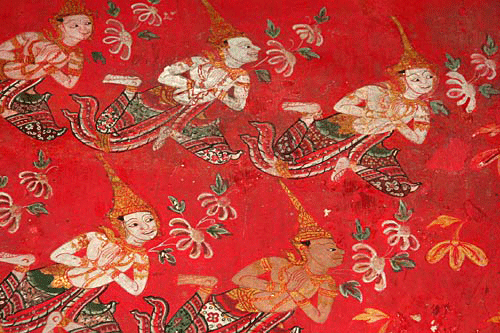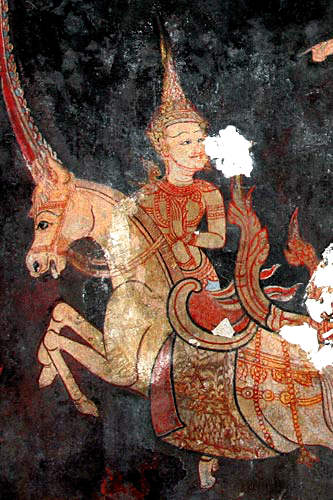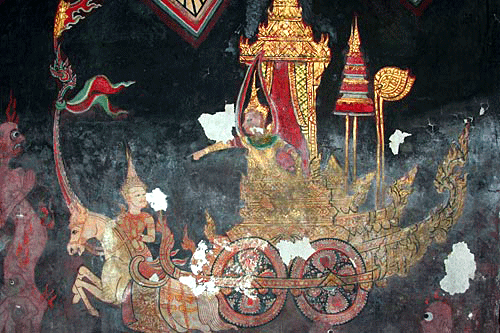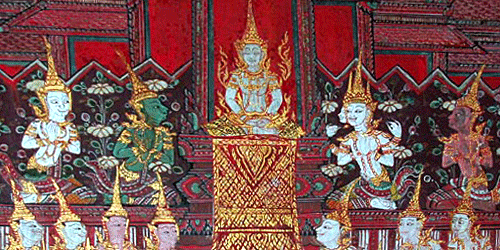———–
NIMI JATAKA

Once there lived a king named Makhadeva, who upon spying his first gray hair told his barber to pluck it out and put it in his hand. When the barber asked him why, he replied solemnly, “This gray hair is a messenger from the heavens. Four and eighty thousand years I have passed as a youth. Four and eighty thousand years I have been king. The time has come for me to renounce my throne and the worldly life, and to live the life of an ascetic eighty-four thousand more years.” True to his word, King Makhadeva handed his kingdom over to his son, charging him to be alert to his first gray hair so that he too could take up the hermit’s life and give the kingdom to his own son. And so it happened. Son after son after son of the line of King Makhadeva reigned until the sign of the first gray hair, then exchanged kingship for asceticism and, like their forefathers, upon death entered the heaven of pure intellect, Brahma’s heaven.
Eighty-four thousand generations minus two passed, and King Makhadeva, from his place in Brahma’s heaven, was pleased that all his descendants had followed his example. Then he pondered, “Will any of us attain Nirvana now?” He perceived that the state of nonbeing was not within the reach of any of his line. This being the case, Makhadeva resolved to round off his family line by coming to earth again as the son of his descendant the present king of Mithila. In this way he would be reborn as a king, bear one more son to whom he would give his throne, and become an ascetic once again. Then, after his death, he would watch his childless son turn to the holy life and finally end the cycle of Makhadeva’s family.

As king, Nimi was faultless, ruling by example, giving alms, caring for the poor as if they were his own kinsmen, and observing in earnest the holy days. Indeed, he inspired many of his people to lead such good lives that upon death they reached the realm of Sakka’s heaven.
Now King Nimi, like all truly good men, was not satisfied with himself and yearned to know the answer to one great question: which is more fruitful, the holy life or faithful almsgiving? So strong was his desire to learn the truth that Sakka’s throne became warm and the king of the gods sped in person to Nimi’s chamber. The palace became like a fiery light as Sakka entered and explained : “Good King Nimi, I have come to help answer your question. The holy life, in which a man lives as an ascetic, is by far the more fruitful, for by meditating he can go beyond my heaven, where we gods still have senses and feelings, to Brahma’s heaven, where only the intellect remains, and sometimes beyond that, to Nirvana. Nevertheless, almsgiving to all, regardless of caste, is right and befits a great man and a king such as you, King Nimi.” Without further delay Sakka departed, leaving Nimi pondering his words.
When Sakka reached his home, Tavatimsa heaven, he described at length the good and pious King Nimi to the deities. They were overjoyed to hear of him, for some of them were former subjects of his, and they cried, “Let us see him ! We wish to look upon him again, for at one time from his very own lips we received his teachings, and through his example we attained Godhood.” They persuaded the great Sakka to agree.
And so he ordered the divine chariot to appear and be readied for a journey to earth. Matali the charioteer was called upon to guide the chariot, pulled by one thousand thoroughbred steeds, to earth to bring King Nimi back to heaven to stand before the gods.
On the festival of the full moon, after traveling earthward for many days, the chariot appeared over the city of Mithila in the kingdom of Videha, whose people were still celebrating though it was late at night. Catching sight of the celestial chariot as it shone above their heads in the sky, they marveled at it and wondered what it might be. A second moon? A sign from heaven on this festival day? When they saw that it was a chariot, they realized that it must be Sakka’s own vehicle come to their king, whose righteousness had caught the eye of the gods.
Matali guided the chariot to the eastern window of the palace, where King Nimi was seated contemplating; and as the moon rose in the east, Matali called out, “King Nimi! The deities of Sakka’s heaven are well pleased with you and are longing to see you. I am sent by the King of the Gods himself to escort you to his realm.”
King Nimi accepted graciously, but before entering the chariot, he told his people that he would not be gone long. As they rose into the sky, Matali asked him which road he would like to take first, the one to heaven or the one to hell. Nimi, knowing that whatever befell him, he would always be able to see heaven, chose the road to hell, saying, “Take me first to the bowels of the universe, to hell, where the condemned dwell.”
Matali plunged the chariot into the blackness of the various worlds of hell. Fires blazed, and soon they saw below them the burning River Vetarani, covered with brine that erodes the flesh, emitting the most fetid odors, and filled with struggling sinners. Nimi wept to see such suffering and cried out to Matali, “0 Matali, what did those men do to be cast into such a river?” Matali told him in what ways they had been cruel and how their wrongdoing had begotten other evils.

Then Matali made this river disappear and summoned the next hell to appear, where misers and men who had been selfish with ascetics and Brahmins were being torn by black dogs, crows, and vultures. Nimi shook and shuddered to see still another hell where those who had tormented other people were being pounded with hot lumps of coal, and another where perjurers and debtors struggled to climb out of a fiery pit. At the sight of the hell where animal haters struggled head-down in iron caldrons filled with boiling water or fire, Nimi was filled with fear and horror.
But Matali was unrelenting. He was determined to show Nimi all the hells : the one where dishonest grain sellers lay prostrate with heat, having been given water which instantly turned to chaff as they drank ; the one where spears and arrows were plunged into the sides of men who had stolen and cheated others; the one where animal slayers were torn to shreds. Farther on, Nimi had to witness malicious men being forced to eat filth and garbage and those who had committed patricide and matricide drinking from a river of blood. Still farther on, greedy hagglers struggled like fish on hooks which pierced their tongues. Adulterous women wailed and waved their arms hopelessly, their upper halves in flames, their lower halves buried in mud. Still others strained endlessly to climb out of hell’s windows, only to fall again and again. And Nimi grieved for them all that their evil deeds had brought them to this.
Meanwhile, the deities in Sakka’s heaven wondered why Nimi was so long in coming. “Matali is wasting Nimi’s lifetime visiting all the hells,” they cried. “Tell him to hurry.” Sakka sent a speedy messenger down to hell. When he finally reached them, he called out to Matali, “Show the king all the hells at once, that this visit be ended straightaway. The gods are impatient and are afraid you are using up Nimi’s lifetime.” Thus Matali opened all the worlds of hell to Nimi’s sight, then turned the chariot heavenward and rushed the shocked Nimi away, his mind dazed by the horrors he had witnessed.
Swiftly the vehicle rose, passing heavenly mansions of great beauty, allowing Nimi to catch brief fragrances of gardens which perfumed the air, to glimpse crystal palaces which sparkled like gems, and to hear strains of cool celestial music sung by sweet nymphs and birds. To Nimi, each heavenly abode seemed more beautiful than the last, and at each he engaged Matali in conversation, asking, “What good did this mortal do in his earthly existence? Who was he that he attained such a celestial state?” Matali explained that the man who lived in seven mansions with his wives had in his lifetime given seven hermitages to seven hermits, that the women who dwelt in palaces of crystal with hundreds of columns, bells and banners, flowers and lakes, had been women who had always kept the holy days. He described how still others, who lived in mansions of gems filled with heavenly musicians playing lutes and singing, had fed holy men and provided their cities with parks and wells.

Once again, Matali’s thoroughness in answering Nimi’s questions annoyed the deities in heaven until they pressed Sakka into sending yet another swift messenger to hurry them along. “No more delay,” cried the messenger. “Show Nimi all the heavenly mansions at once.” After Matali opened up the heavens to Nimi’s vision, he urged the horses on faster and faster.Upward the carriage rose, past the seven hills surrounding Mount Sineru, past the heaven of the Four Great Kings, until at last, within sight of the huge statues of Sakka himself that framed the Cittakuta gateway to his heaven, Matali slowed the chariot with its one thousand steeds to a halt. As he led the chariot to a side platform on which he could land, Matali pointed out the eight-sided columns made of rare gems that supported the palace and announced to Nimi, “This is Tavatimsa, the heaven of the thirty-three ; here the gods assemble, all thirty three of them, with their master Sakka, the king, who looks after men and gods alike, permitting some to enter his heaven, others to remain, sending still others to hell. It is a beautyful and most sensual place, 0 King, as you shall see.”
As they alighted, the deities ran to the gateway to greet Nimi with flowers and perfumes. The mighty Sakka begged him to be seated on his own throne and to stay to enjoy the delights of his heaven. Nimi, however, replied that he came not for unearned pleasures but for discussion of the moral precepts. For seven days Nimi charmed the company of heaven with his discourse, and at the end of that time, he again refused Sakka’s invitation to remain. He felt that his people needed him. “Now I must depart,” he said. “My subjects await me.”
Once again the chariot was prepared and Matali summoned. Nimi bade the gods a friendly farewell and began his journey back to Mithila. When the chariot came in view of the city, the people again looked up wonderingly. Then, recognizing their king within it, they cried out with joy. Matali drove the chariot around the city once, put Nimi down at the eastern window of the palace, and departed for Sakka’s realm. As King Nimi the Bodhisatta alighted, his subjects surrounded him and questioned him. Nimi told them of the wonders he had seen and of the peaceful existence of all who dwell in heaven. He also told them of the horrors he had witnessed in the underworld.
“Do good,” he advised them. “Be charitable and of a pure heart, and you shall be reborn someday to such a heaven. Some of this kingdom’s own people did I see there who, having done good in this city, have become deities in Sakka’s heaven. All of you can attain that. But beware of evildoing, for I have seen in the worlds of hell more suffering and torture than my tongue can describe.”
Years later, when the king’s barber showed Nimi his first gray hair, Nimi knew it was time to give his kingdom to his son. From then on, he lived as an ascetic in a mango grove at Mithila and upon his death surpassed Sakka’s heaven to enter the Brahma heaven, where all is mind and wisdom. Thus it was that Nimi, as the Bodhisatta, rounded off King Makhadeva’s line and with the death of his son ended the cycle in the four and eighty thousandth generation.




